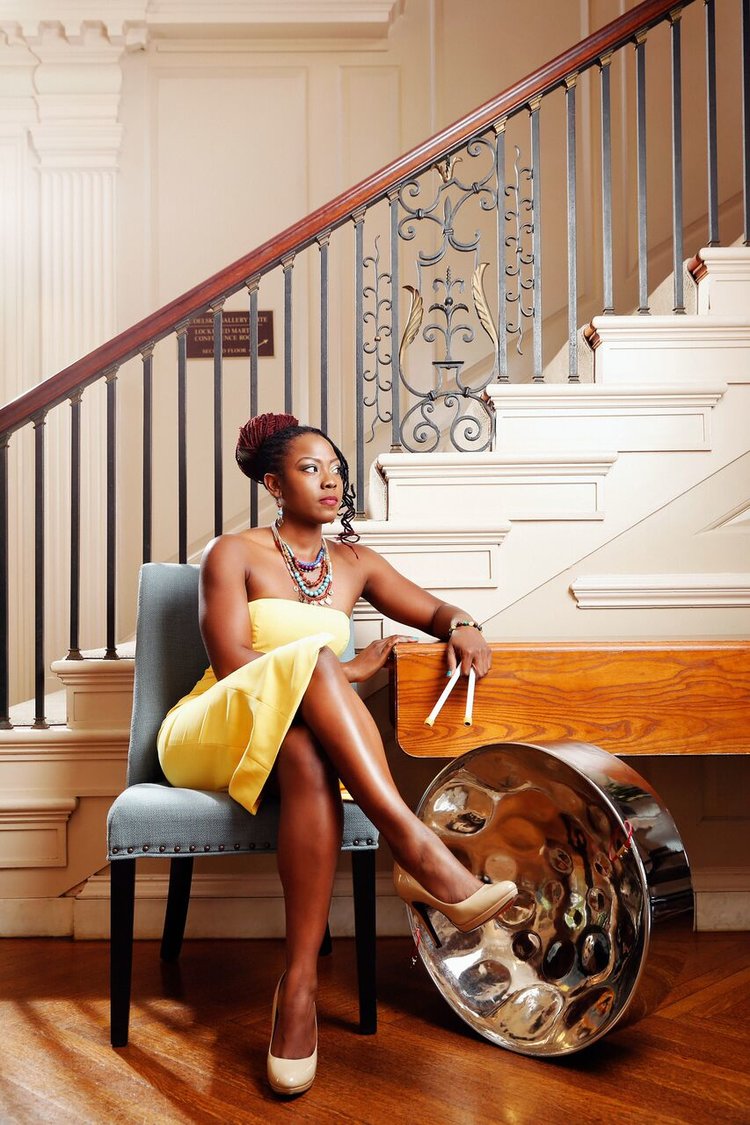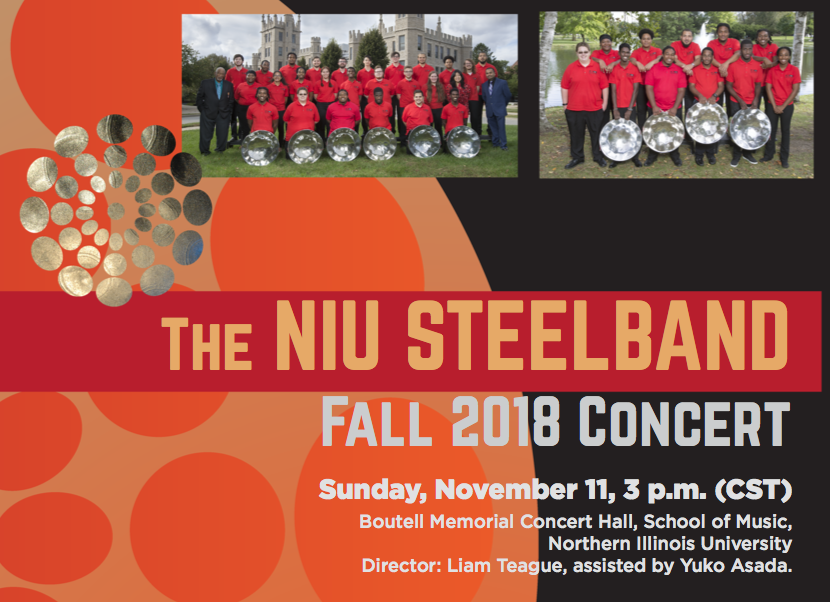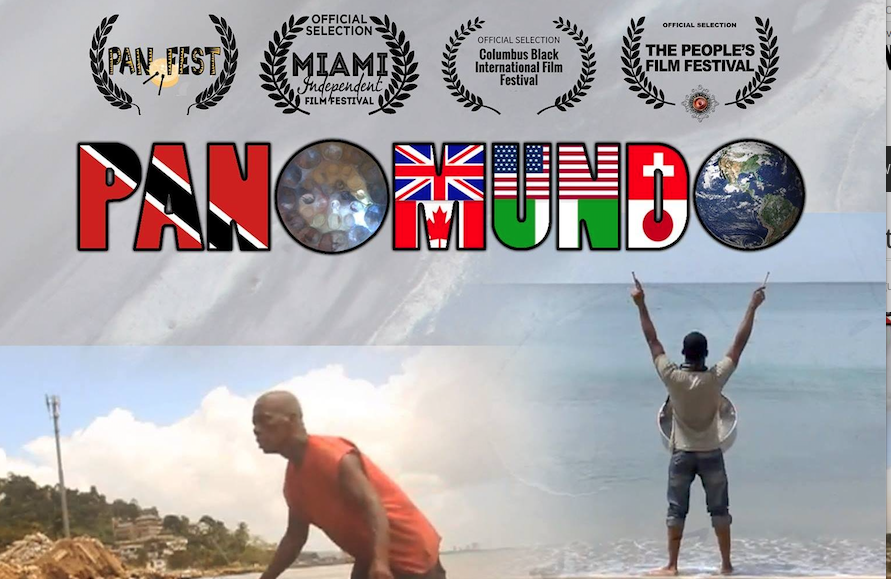Josanne Francis loved pan from the first time she saw it. She loved it so much she decided to make it a career by performing and teaching pan at the International High School at Langley Park in Bladensburg, Md. and as artistic director of CAFE (the Cultural Academy for Excellence). Like most successful educators, her journey would begin as a student, hungry for knowledge.
At the age of eight her mother saw an article in the newspaper offering beginning steelband classes at the Maritones panyard, a medium-sized steelband in Diego Martin, located at the Northern-most part of the island of Trinidad.
“It was a six-week course and we went every Saturday morning for a couple of hours,” Francis explained. “Both my sister and I did really well and she never played after that. I went to a primary school and there was a lady who did steelpan lessons. I went from primary to secondary school at a convent. They had a steelband. I ended up doing that and co-arranged with the school’s band for the junior panorama competition. At around 14 or 15, I got around to where I wanted to be serious about playing steelpan.”
To prove her level of intent, Francis joined local Woodbrook large band, Starlift Steel Orchestra, which has featured master arrangers like Ray Holman, Clive Bradley and Robert Greenidge since its inception in 1956. She also gained experience playing in other bands like Silver Stars and Valley Harps when Starlift didn’t make the finals of Panorama (a major steelband competition in Trinidad). As she prepared to graduate secondary school Francis received a scholarship to study music at the University of Southern Mississippi in Hattisburg, Miss. under the tutelage of Dr. John Wooton.
“I played a lot of percussion, did some gigs by myself and played with a trio in New Orleans a lot. I had my own jazz combo,” Francis said. “I taught a couple of private lessons as well as I met the community steelband in the area, Hattisburg Community Steelband. I love Dr. Wooton. He’s very knowleadgable about music from all over the world.”
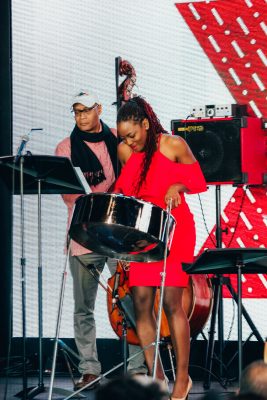 Francis received a Bachelor’s degree in Music Education and quickly moved to begin work on her Master’s degree at Northern Illinois University (NIU), where she learned under the guidance of pan legends Cliff Alexis and Liam Teague.
Francis received a Bachelor’s degree in Music Education and quickly moved to begin work on her Master’s degree at Northern Illinois University (NIU), where she learned under the guidance of pan legends Cliff Alexis and Liam Teague.
“I have always admired Liam Teague and Cliff Alexis. I also had friends at NIU at the time.
A major difference between the two schools was that I was allowed to focus on steelpan primarily at NIU. I was a percussionist at Southern Miss and when I was there I was in the beginning stages of my musical growth. It was excellent for me to be exposed to all the different types of instruments,” Francis said. “Then at NIU, being in the Master’s program, I was surrounded by wonderful musicians about my age who shared the same goals. Working with Liam Teague was just wonderful. I developed my arranging skills, improvisation abilities and regularly played with an orchestra.”
Living the Dream
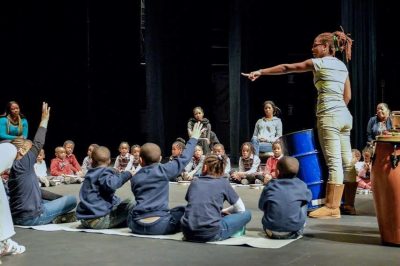 After receiving her M.A. in steelpan from NIU, Francis seeked out a position teaching music and landed at the International School at Langley Park as part of a grant to teach steelpan. The principal alerted Francis of a job opening as a music teacher. She applied, did a demo lesson for the principal and got the job.
After receiving her M.A. in steelpan from NIU, Francis seeked out a position teaching music and landed at the International School at Langley Park as part of a grant to teach steelpan. The principal alerted Francis of a job opening as a music teacher. She applied, did a demo lesson for the principal and got the job.
“I’m the only arts teacher at the school. I run the entire music program which includes a general music class, a lot of world music, piano and a lot for steelpan,” Francis said. “I’m also the artistic director at the Cultural Academy for Excellence (CAFE). It’s a 21-year-old arts-based program. I supervise the artistic elements like stelband and visual art. We have three student steel orchestras. The advanced steel band is comprised of middle and high school students. It’s grown tremendously over the years. Every year I take them to the Virginia Beach Panfest. The bands have won their categories several times. Positive Vibrations have won two or three times in a row as grand champions.”
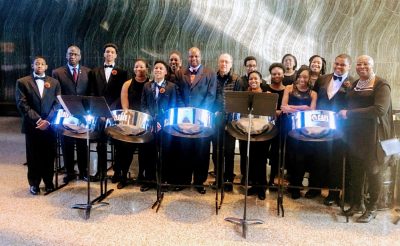
The International High School is only three years old with all students being immigrants or refugees, according to Francis. “Very few were born in the U.S. The majority of them come from Central and South America. A couple come from Syria, one from Iraq, some from Africa and some Filipino students as well.”
The instruments used at the school are from CAFE thanks to the number of instruments the program has at its disposal. All pans were made by legendary steelpan builder, Herman “Guppy” Brown. He made the pans and sent them here without receiving a dollar. He trusted the program enough to pay after getting them. The CAFE steelband started in the basement of CEO Lorna Greene who saw what pan did for her daughter when she went to NIU. Greene started a community band for her friend’s kids. They went to her house for music, another friend for ballet, and it grew from there over the years.
In addition to teaching full-time and running CAFE, Francis is also a Strathmore Artist in Residence. Strathmore is a nonprofit multi-disciplinary arts center known for presenting visual and performing arts at different venues in Bethesda, Md.
“It’s designed for young up-and-coming musicians. Each year they open up for applications. You apply online and submit some examples and they let maybe 20 people to do a live audition. From that bunch of people they select six musicians who will serve as Artists in Residence at Strathmore,” Francis said. “Lots of professionals come in to educate us on how to be musician entrepreneurs. They teach things like how to make a set list, marketing, being a good band leader and how to do taxes. It starts in September and goes until June. Then each artist has their own month at the mansion. There are concerts each month, then the fourth wednesday is another concert. Each artist will be premiering a new work in their last concert as well. It’s been a really good experience getting all I can get out of it and meeting and working with other artists as well.”
Rocky, Yet Bright
Francis has been able to achieve a great deal with both her school bands and CAFE in just three years, including performing at the Kennedy Center and with artists like Liam Teague, Robert Greenidge, Andy Narell, Etienne Charles and Arturo Tappin. The biggest challenge CAFE faces is funding due to its non-profit status, Francis added.
“We get the majority of our money from the department of family services and some from AHD (Association for Housing Development). They also provide us with the building we’re in. We don’t have to pay rent or utilities,” Francis said. “At the same time, when we moved in to that building we decided to give back to that community, which is a low income housing area. There’s a lot of immigrant students there. We offer them very discounted tuition for the after school and Saturday program. We would get after school services for $100. It definitely is worth a lot more than that. They get picked up from school, get a snack, assistance with all of their homework, tutoring and mentorship from college students in the area.”
Another challenge Francis has had to overcome is language due most students coming from non-English speaking backgrounds. Thankfully, the school has a way of accomodating language. “You’re still teaching the language of English. I’m teaching music and English because students are learning English. I’m helping them learn everyday.” Last year, CAFE partnered with a hispanic sorority. A lot of college students helped translate for Spanish-speaking students, which was a huge relief, according to Francis.
Francis hopes to continue teaching steelpan and promoting the instrument for future generations in her own special way. “Eventually I do want to have my own school for the arts where I’m focused on kids to learn, develop and master whatever their art is. Not so much a private school but like an academy,” Francis said. “My experience from working with CAFE so far has given me a lot of insight in running an arts organization and managing people. There’s a lot I have to learn still and a lot of resources I have to develop before I get into the idea. I’m developing the idea as a manager and performer and as someone kids can look up to as a teacher.”
The difficulty of teaching and performing pan in a world that either is unaware of its capabilities or considers it a novelty is not lost on Francis who struggles every day with it. “It’s not easy because of the lack of respect that people have but it is your job to educate people on what you do. I just want to keep pushing the instrument forward and getting people to accept it as an instrument of study,” Francis said. “Every time I perform somewhere I educate people. There are a lot of naysayers out there who will doubt you. Just keep pushing through. If you know what you want, go after it—you can get it.”

